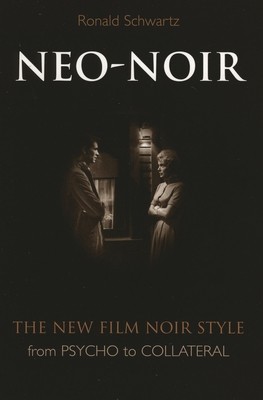
- We will send in 10–14 business days.
- Author: Ronald Schwartz
- Publisher: Scarecrow Press
- ISBN-10: 081085676X
- ISBN-13: 9780810856769
- Format: 17.1 x 22.8 x 1.1 cm, minkšti viršeliai
- Language: English
- SAVE -10% with code: EXTRA
Reviews
Description
According to many critics, the era of Film Noir ended with the 1958 release of Orson Welles' classic Touch of Evil. The style was not dead, but rather had been transformed, and two years later, Alfred Hitchcock ushered in a new era of Noir films with the release of his 1960 masterpiece, Psycho. Film scholar Ronald Schwartz examines the most significant representatives of this cinematic style, beginning with Hitchcock's shocker and concluding with Michael Mann's Collateral (2004). Schwartz provides in-depth analyses of over thirty of the best Neo-Noir films and explains the qualities and characteristics of the new noir style. He also explains how it differs from Film Noir of the forties and fifties. As this study reveals, the new style significantly impacted American film after 1960. In this chronological guide, Schwartz examines such landmark films as The Manchurian Candidate (1962), Point Blank (1967), The French Connection (1971), Chinatown (1974), Taxi Driver (1976), Body Heat (1981), Blood Simple (1984), Fatal Attraction (1987), The Grifters (1990), Reservoir Dogs (1992), The Usual Suspects (1995), L.A. Confidential (1997), Memento (2000), and Mystic River (2003). The book also includes an alphabetical filmography, listing over 650 films that in plot, style, or subject matter reflect the diversity of the genre. This reference work will be a valuable resource for film scholars and fans alike who wish to further explore the ever-evolving aspects of Neo-Noir cinema.
EXTRA 10 % discount with code: EXTRA
The promotion ends in 22d.22:09:17
The discount code is valid when purchasing from 10 €. Discounts do not stack.
- Author: Ronald Schwartz
- Publisher: Scarecrow Press
- ISBN-10: 081085676X
- ISBN-13: 9780810856769
- Format: 17.1 x 22.8 x 1.1 cm, minkšti viršeliai
- Language: English English
According to many critics, the era of Film Noir ended with the 1958 release of Orson Welles' classic Touch of Evil. The style was not dead, but rather had been transformed, and two years later, Alfred Hitchcock ushered in a new era of Noir films with the release of his 1960 masterpiece, Psycho. Film scholar Ronald Schwartz examines the most significant representatives of this cinematic style, beginning with Hitchcock's shocker and concluding with Michael Mann's Collateral (2004). Schwartz provides in-depth analyses of over thirty of the best Neo-Noir films and explains the qualities and characteristics of the new noir style. He also explains how it differs from Film Noir of the forties and fifties. As this study reveals, the new style significantly impacted American film after 1960. In this chronological guide, Schwartz examines such landmark films as The Manchurian Candidate (1962), Point Blank (1967), The French Connection (1971), Chinatown (1974), Taxi Driver (1976), Body Heat (1981), Blood Simple (1984), Fatal Attraction (1987), The Grifters (1990), Reservoir Dogs (1992), The Usual Suspects (1995), L.A. Confidential (1997), Memento (2000), and Mystic River (2003). The book also includes an alphabetical filmography, listing over 650 films that in plot, style, or subject matter reflect the diversity of the genre. This reference work will be a valuable resource for film scholars and fans alike who wish to further explore the ever-evolving aspects of Neo-Noir cinema.


Reviews